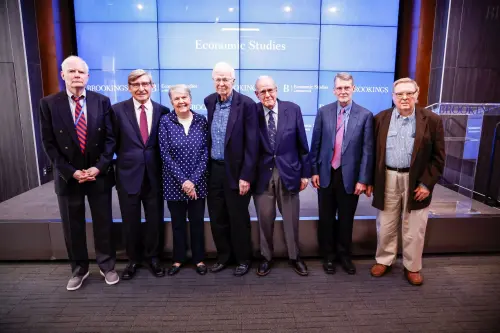Executive Summary
Business-led civic organizations have historically played an important role in urban policymaking, planning, and renewal. These elite organizations of CEOs of the area’s largest employers could quickly mobilize their members’ personal devotion to the community, their dealmaking talent, and their ability to commit corporate financial resources to their city’s emerging needs.
However, shifting economic forces have diminished the capacity of these CEO-led organizations, potentially stripping cities of a significant advocate. Mergers and acquisitions have reduced the number of home-grown CEOs, with their personal commitment to their hometown. The loss of major banks following deregulation has affected both financial contributions to civic causes and leadership in the corporate community. Declining employment in manufacturing has led to the demise or relocation of major firms, and with them the loss of prominent CEOs. In addition, as firms relocate to the suburbs, the focus of business-led civic associations has shifted away from the city and toward regional affairs. CEOs today also have less autonomy than in the past in their ability to commit resources, and their travel and time demands have increased markedly.
The paper traces the shifting landscape of business-civic organizations in 19 U.S. metropolitan areas. It documents the changing economies in these regions during the past three decades, including shifts in their industrial structure and the rise and fall of Fortune 500 firms located there. It examines how these shifts have affected the level and character of participation in local and regional public affairs by corporate CEOs, focusing particularly on the makeup, agendas, and roles of peak business organizations. It also discusses the implications of these changes for the capacity of cities and urban regions to address major urban problems.
It finds that:
- The pool of CEO civic leaders is shallower, more transient, and less influential. Higher turnover in executive ranks, more transient positions, less involvement among the new generations of CEOs, the lack of mentors for CEOs in emerging fields, and less autonomy combine to leave CEOs with less time and willingness to commit to civic organizations.
- The role of nonprofit employers and foundations has grown. The nonprofit sector— particularly universities, medical centers, and foundations—has contributed significantly to the growth in service employment in many regions, and its engagement in civic affairs has become increasingly important. The nonprofit sector, however, is often less interested in economic development initiatives—the primary priority for CEO organizations.
- Mergers with area chambers of commerce have become more common. Where membership was once restricted to CEOs only, today local foundations, small business, and others are folded in to memberships, and mergers with local chambers of commerce are more common. These consolidation and mergers may risk dampening bold and imaginative action and may also result in a broader regional focus.
- Paid professional managers are more common. The organizations have increasingly hired professional managers and staffs to handle affairs, with CEOs assuming fewer planning and agenda-setting roles. The increased reliance on paid association staff and professional executives to initiate agendas, mobilize corporate resources, and staff projects reinforces the tendency toward cautious action at the same time as it has strengthened interest in regionalism.
- Governing alliances with mayors have weakened as the focus shifts away from the city. CEO-led organizations are more often reaching out to state and regional officials as well as members of Congress as the scope of their planning shifts to regional issues. To recapture the attention of CEO-led organizations, mayors must become more skilled in mobilizing corporate time and talent in the city’s interest. They must anchor alliances with individual executives who are committed to the city. They must effectively involve CEOs in issues for which they can readily provide assistance, publicly recognize their contributions, and consider them respected informal advisers. Mayors must also emphasize the connection between the fate of the central city and its regional economy.
As a result of these and other changes, the CEO-led civic organizations have become less cohesive and risk losing their capacity for sustained action.
Download the Baltimore Case Study »
Download the Cleveland Case Study »


